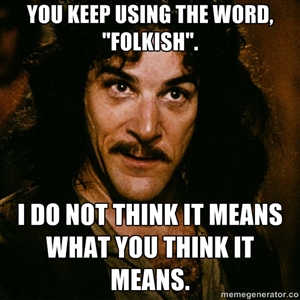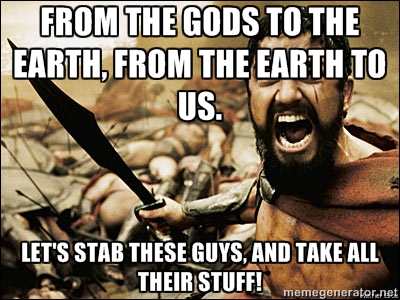 EDIT 10/3/2013: I was politely informed by the author that his is not Jon Upsal but Joseph Bloch. The “Garden of Jon Upsal” is the name of Mr. Bloch’s blog, and the title is a reference to Odin out of Danish folklore. I am sorry for any and all confusion this my mistake and lack of due rigor may have caused.
EDIT 10/3/2013: I was politely informed by the author that his is not Jon Upsal but Joseph Bloch. The “Garden of Jon Upsal” is the name of Mr. Bloch’s blog, and the title is a reference to Odin out of Danish folklore. I am sorry for any and all confusion this my mistake and lack of due rigor may have caused.
So this week, someone decided to step forward and make an argument against the perceptions of racism that surround the various folkish perspectives. This man, Jön Upsal, put forth a lot of arguments. To be plain about it, I think many of his talking points are weak and don’t address nearly so much as he seems to want them to. To his credit, he did say that racism and folkishness could be paired together; he simply claimed that it was not as common as most people perceive.
In the next day or two, I will be addressing his essay and explaining why I do not feel his arguments hold water. This will be done in a manner that is both respectful and measured; it’s really easy to point at someone and rip them apart using emotional rhetoric, but such actions will never address arguments. Mr. Upsal accuses the Pagan community of making “false equivalencies and shill hyperbole”, so I want to address his complaints in a manner that is neither of these things.
 One of these issue that I want to bring up, however, will come across as hypocritical; his use of graphics. The above picture is one that Mr. Upsal featured along side of the aforementioned blog post, and I think it’s intended meaning is easy to calculate; the broader Pagan community is simply looking for someone to label as a racist, and isn’t interested in actually talking about the finer points of things. There is nothing about the man that indicates he’s a racist, other than a sign that has been put on to him. In this way, the broader Pagan community is acting exactly like the very bigots they are claiming to be in opposition of. As such, their arguements with the AFA are hypocritical and moot.
One of these issue that I want to bring up, however, will come across as hypocritical; his use of graphics. The above picture is one that Mr. Upsal featured along side of the aforementioned blog post, and I think it’s intended meaning is easy to calculate; the broader Pagan community is simply looking for someone to label as a racist, and isn’t interested in actually talking about the finer points of things. There is nothing about the man that indicates he’s a racist, other than a sign that has been put on to him. In this way, the broader Pagan community is acting exactly like the very bigots they are claiming to be in opposition of. As such, their arguements with the AFA are hypocritical and moot.
Mr. Upsal does not support the argument that this picture makes. He is quick to make complaints , but doesn’t actually say what these complaints are against. He doesn’t bring forth the accusations, simply saying that they exist and are false. The picture above is the closest he come to making the argument, and it does a horrible job of explaining itself.
And here is were we get to the place where a criticism of hypocrisy could be made. It might go something like, “But Harrison! You post your memes all the time, often making jokes that support your articles! You’re doing the same thing!”
No, I’m not. The memes rarely (if ever)* exist to prove an argument, and they’re usually just throw away jokes. A few of them have a kernel of truth to them, and use the “inside joke” nature of a meme in order to make that kernel into something that stand out a little more. Even when that’s the case however, They’re not being made in the absence of actual proof, as I believe Mr. Upsal has done.
 Sometimes I worry about how much I over analyze or dig into a given issue, and the memes are my way to balance all the angst and tension I feel I might be bringing up. The antacid that helps quell the pain of a somewhat caustic meal. Sometimes the jokes aren’t even there for my audience; they’re there for me as a way for me to address my own anxiety.
Sometimes I worry about how much I over analyze or dig into a given issue, and the memes are my way to balance all the angst and tension I feel I might be bringing up. The antacid that helps quell the pain of a somewhat caustic meal. Sometimes the jokes aren’t even there for my audience; they’re there for me as a way for me to address my own anxiety.
I have tried to attack a lot of big issues here, and it’s not always a fun time. While I love the work I’ve been doing, and it’s something I hope to be able to make a living off of someday, it’s also work that leaves me conflicted, frustrated, and depressed a lot of the time. Talking about all the negativity that I end up having to talk about actually takes a lot out of me, and I don’t have fun making the accusations I make. I have been, thus far, pretty fortunate in the lack of negativity I have received for my words. With every article I write, I wonder if this is going to be the post that opens up the gates of hate mail.
I take no pride or joy in saying a lot of this stuff. I don’t have fun saying that the members of the AFA conduct themselves as if their organization was pro-racist. I don’t enjoy saying that I think Steven McNallen has to either be racist or insane to believe the stuff he writes and publishes on his organization’s website. I don’t even enjoy having to call out Mr. Upsal and saying that his argument is flawed, weak, and seems to purposely forget to address entire platforms. I don’t like picking apart the Nine Noble Virtues, having to defend Loki worship, trying to explain why this nonsense between Universalists and Folkists needs to stop, or anything else. These aren’t fun things; they’re necessary things.
It’s important that we speak on these matter, because if we aren’t willing to have the difficult conversations about what our religion means than no one will be. That means muckraking, and demands we call out people and hold them to account. It means on insisting explinations be given by those who would make statements on behalf of huge chunks of the Norse Polytheistic masses. It depends being even handed, passionate, and thoughtful.
 The last think I want to do, however, is be a creature of misery. I disagree with the notion that we can’t have meaningful discourse that contains a measure of levity. Yes, these are heavy and ponderous issues but I see no reason that we have to be miserable and dour along the way. When all a person does is fight monsters, than they risk becoming monsters themselves. So I crack jokes. I find the silly and seek out the absurdities in an effort to ground myself, and anyone else who might be reading my words.
The last think I want to do, however, is be a creature of misery. I disagree with the notion that we can’t have meaningful discourse that contains a measure of levity. Yes, these are heavy and ponderous issues but I see no reason that we have to be miserable and dour along the way. When all a person does is fight monsters, than they risk becoming monsters themselves. So I crack jokes. I find the silly and seek out the absurdities in an effort to ground myself, and anyone else who might be reading my words.
The pictures I post on this blog aren’t made in leiu of the arguement. They are rarely even made as part of it. There are made to give us all a reason to smile because religion should be a happy thing, not the contentious thing it has come to be seen as.
They say that a picture is worth a thousand words; I try to find the pictures that are worth a thousand words that proudce laughter, because those are the words the majority seems to need the most.
*I can’t find a meme that actually really made my argument for me, but I can’t deny that someone else might be able to make a valid argument that one did. As such, I’m leaving the door open.
Take a look at my profile on Patreon! It gives me a chance to earn a living doing the stuff you enjoy, while also giving me a way to tell you about the work that I’m doing!














